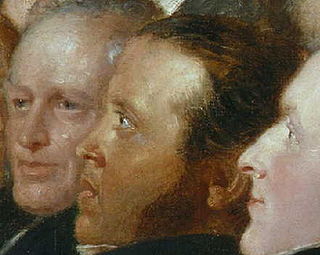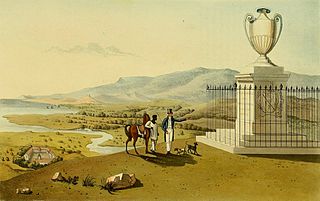Related Research Articles

The Caribbean Island of Jamaica was initially inhabited in approximately 600 AD or 650 AD by the Redware people, often associated with redware pottery. By roughly 800 AD, a second wave of inhabitance occurred by the Arawak tribes, including the Tainos, prior to the arrival of Columbus in 1494. Early inhabitants of Jamaica named the land "Xaymaca", meaning "land of wood and water". The Spanish enslaved the Arawak, who were ravaged further by diseases that the Spanish brought with them. Early historians believe that by 1602, the Arawak-speaking Taino tribes were extinct. However, some of the Taino escaped into the forested mountains of the interior, where they mixed with runaway African slaves, and survived free from first Spanish, and then English, rule.

Sir William Beckford was a Jamaican-born planter and Whig politician who twice served as Lord Mayor of London in 1762 and 1769. One of the best known political figures in Georgian era London, his vast wealth derived from the sugar plantations and hundreds of slaves he owned in the British colony of Jamaica. In Britain, Beckford was a supporter of the Whig party, including Prime Minister William Pitt, 1st Earl of Chatham. He also publicly supported progressive causes and frequently championed the London public.

The Baptist War, also known as the Sam Sharp Rebellion, the Christmas Rebellion, the Christmas Uprising and the Great Jamaican Slave Revolt of 1831–32, was an eleven-day rebellion that started on 25 December 1831 and involved up to 60,000 of the 300,000 slaves in the Colony of Jamaica. The uprising was led by a black Baptist deacon, Samuel Sharpe, and waged largely by his followers. The revolt, though militarily unsuccessful, played a major part in the abolition of slavery throughout the British Empire.
Some members of the Barrett family played an important role in the history of Jamaica. Hercie Barrett and family members migrated from England, landing on the island of Jamaica in 1655. In the years that followed, several family members acquired substantial wealth and influence. They controlled much of the island's mining and agriculture, becoming one of the most prominent plantation owners of Jamaica.
A post-creole continuum is a dialect continuum of varieties of a creole language between those most and least similar to the superstrate language. Due to social, political, and economic factors, a creole language can decreolize towards one of the languages from which it is descended, aligning its morphology, phonology, and syntax to the local standard of the dominant language but to different degrees depending on a speaker's status.

William Knibb, OM was an English Baptist minister and missionary to Jamaica. He is chiefly known today for his work to free enslaved Africans.

Peter Beckford was a Jamaican-born planter, politician and merchant who served as speaker of the House of Assembly of Jamaica from 1707 to 1713, and again in 1716. The son of one of the richest men in the colony of Jamaica, Beckford sat in the House of Assembly of Jamaica for three decades and acquired a vast financial estate. His wealth would go on to support the political careers of his children in Great Britain.
Colonel Sir Thomas Modyford, 1st Baronet was a planter of Barbados and Governor of Jamaica from 1664 to 1671.

Isaac Norris was a merchant, slave trader and prominent figure in provincial Pennsylvania, including mayor of Philadelphia in 1724.

Hibbert House, also known as Headquarters House, is the head office of the Jamaica National Heritage Trust. It is located at 79 Duke Street in Kingston, Jamaica. It was built by Thomas Hibbert, a wealthy young English merchant, in 1755 to serve as his residence. Hibbert migrated to Kingston in 1734, at a time when Jamaica was becoming the largest and wealthiest of the British Caribbean islands and the largest single destination of African slaves. In the early 1750s, he formed a partnership with Nathaniel Sprigg to serve as factors for slaves, purchasing them off the ships from Africa and reselling them to planters and others in Jamaica. Hibbert also helped found a major West Indian house in London, trading in sugar and rum.

Thomas Hibbert (1710–1780) was an English merchant and planter who became a prominent figure in colonial Jamaica.

The Crown Colony of Jamaica and Dependencies was a British colony from 1655, when it was captured by the English Protectorate from the Spanish Empire. Jamaica became a British colony from 1707 and a Crown colony in 1866. The Colony was primarily used for sugarcane production, and experienced many slave rebellions over the course of British rule. Jamaica was granted independence in 1962.

The House of Assembly was the legislature of the British colony of Jamaica. It held its first meeting on 20 January 1664 at Spanish Town. As a result of the Morant Bay Rebellion, the Assembly voted to abolish self-governance in 1865. Jamaica then became a direct-ruled crown colony.
Edward Jordon (1800–1869), or Edward Jordan, was a leading campaigner for equal rights for free people of color in Jamaica during the nineteenth century.
Robert Osborn (1800–1878) was a Jamaican newspaper editor and campaigner for equal rights for free people of color.
Thomas Sutton was the speaker of the House of Assembly of Jamaica in 1691-92 and 1698.
Francis Rose was a plantation owner in Jamaica. He was active in the politics of the island and was elected to serve in the House of Assembly of Jamaica multiple times, becoming speaker in 1702, and later president of the Council of Jamaica.
Samuel Williams Haughton (1738–1793) was the speaker of the House of Assembly of Jamaica from 1778 to 1793.
Jasper Hall was the speaker of the House of Assembly of Jamaica in 1778.
Alexander Bravo, sometimes spelled Alexandre Bravo, was a Jamaican merchant, politician and planter who served as Auditor-General of Jamaica. Bravo was the first Jew to be elected to the House of Assembly of Jamaica.
References
- ↑ Cundall, Frank. (1915) Historic Jamaica. London: Institute of Jamaica. pp. xvi-xviii.
- ↑ Burnard, Trevor. (2015). Planters, Merchants, and Slaves: Plantation Societies in British America, 1650-1820. Chicago: University of Chicago Press. p. 93. ISBN 978-0-226-28610-5.